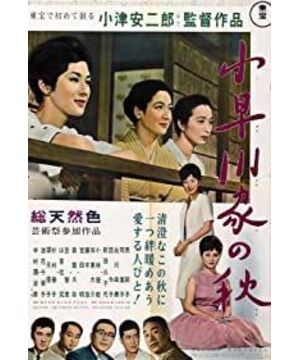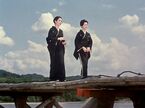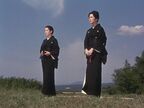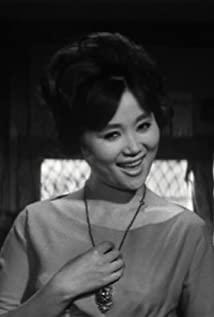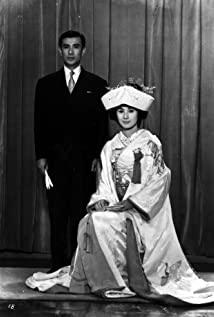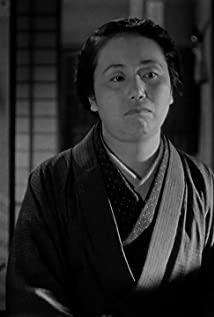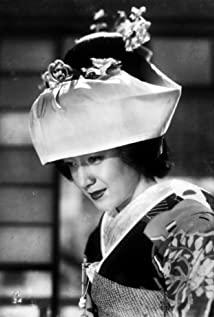Life must be experienced, accumulated, healed from pain, and let go of attachment, in order to achieve a "medium" year" mood. The so-called middle-aged state of mind, I think, is to listen quietly with a smile, and the passionate horn goes away. Abundant possessions have a premonition that they are no match for decline, and Luo Qin can't stand the cold. Is this how life is? That's how life is.
Ozu of "Twilight in Tokyo" has reached the end of despair and the end of the colorless era; after that, he ushered in a clear and clear state of mind, ushering in a new era of color. Coincidence or intentional? We don't know it, but it is clear that "Twilight in Tokyo" was a watershed. Since then, Ozu has reduced the complex and simplified. He has reduced all the flavors of life to a smile of insight and a clear spring of understanding. This clear spring is lively and surging, showing A new interest in life: not passive acceptance of fate, but reconciliation and forgiveness, the ups and downs of life suddenly become clear, calm and broad. Ozu in the color era is still emotional, but it can be stopped; Ozu in the color era has returned to the early humor, such as the true reincarnation of life.
That's why we can see the scheming old man and his sons and daughters fighting wits and courage in "Autumn in the Xiaobayakawa Family". The ups and downs of the business sea and the experience gained from life experience are useless in old age, and are all used to play the game of "hide and seek" with his children. This old man looks like a urchin! With such a character, Li Zhizhong's loyal and benevolent face is obviously uncontrollable, and Ozu's choice of Nakamura Yanjiro is very suitable. He looks a lot like Taiwanese actor Li Liqun. The expression of the old man pretending to be innocent in front of his daughter when he met his lover in private , like the Ouyang Feng portrayed by Li Liqun in the Taiwan version of "The Condor Heroes": laissez-faire, nervous and sincere.
Ozu, who is a good drinker, is not satisfied with "taking advantage of his position" to let the characters in the play run a tavern. This time, he simply gave the Kobayakawa family a brewing business for generations. It is not easy for small workshop-style enterprises to survive after the war, and the background of the era that they were merged by powerful large enterprises one after another. In this film, it is also expressed through the few words of the employees and their children, but it is not important. The autumn meaning of life is the main theme of the film, just like the cicadas roaring from the beginning to the end of the film, while exposing the summer heat, it also reveals a little loneliness that autumn is approaching.
Fluffy voices are always more attractive, and the human feelings embedded in the gaps of the great changes have been ignored because they are commonplace. How to express things that are plain to simple? Ozu in the color era chose to use a mellow tone, the proportion of which is thick but not intense, bright but not vulgar, slightly drunk but not drunk, and knows the satisfaction and regret of destiny, such as the two sides of sunshine and shadow, at first glance. Warm and cold, lingering. Jiechen said: "Beauty and loneliness are the souls of Japanese literature and art. Because of beauty, loneliness is deep. And life is essentially the word loneliness, so it needs more beautiful joy."
"Autumn in the Xiaobayakawa Family" Not so with the old brewers in . When people reach old age, the career has been handed over to the second son-in-law who is in the family, and the second daughter is in charge of the housework, becoming more and more mother-in-law. The eldest daughter became a widow at a young age and dragged a child. The youngest daughter has not moved since she was old. How many times the blind date activities have been organized, she has never made a clear statement. Is this the old age that the ambitious, energetic, and powerful young pass away? If it weren't for the lover you met when you were young on the street, this life would be so boring and boring!
The old man's dead wood is in the spring, and every day Xinxin looks like an excuse to go out, which is really interesting. He got rid of the clerk sent by his son-in-law to follow him, and he could be described as a strong figure; he went to a hotel run by a woman, rushing to work and mopping the floor, and his attitude was considered diligent; Come and follow me", it was funny and irritating; and when he was just recovering from a serious illness, he took the opportunity of playing hide-and-seek with his grandson to sneak out, which was simply naughty. That kind of mentality that is afraid of being blamed but can't restrain "getting into trouble" is not the mentality of an urchin. No wonder people always say "the old is still young", the growth of children is always accompanied by the aging of their parents, it is a process of exchanging life energy, one side loses authority and the other establishes authority, one day, when you face your children, you don't dare to be positive. Conflict, when you can only play around and break through, old age officially comes, such as the old man in the film.
The old man also has a daughter over there. The "authenticity" film of this daughter has never given a positive answer. The daughter shouted "father" happily, just wanting the father who fell from the sky to buy her a mink coat; the old man smiled and agreed, probably also to be respected and relied on for fun, so as to relive the authority and doting of others. Ability; when the woman faced her daughter's questioning, her words were vague, and the most strange thing was that she might hope that the daughter was the old man's, so that the trance in the passage of time could come true and have something to rely on. Or the butterfly-like modern and realistic daughter said: "No matter who my father is, it is a fact that I exist in this world."
Heartless open-mindedness is better than life and death. I think this is the point of view that Ozu wanted to express when he was writing the script, drinking the 80th bottle of wine and watching the spring flowers outside the window turn into autumn fruits.
The old man who changed the sky in midsummer died before autumn. It is also death. The death of "Autumn of the Kobayakawa Family" is obviously much "easier" than the death in "Tokyo Story". At this time, Li Zhizhong appeared. The unrelated farmer looked at the thick smoke from the chimney of the crematorium, and asked and answered questions about reincarnation with his wife, which had a strong symbolic meaning. Death is a part of life, life and death are bound together, and life is endless, this is the true face of life. As Gu Cheng wrote in "Grave Bed":
I know that eternal death is not sad
. In the pine forest lies my wish
. There is a sea below and
looks like a pool
from a distance. It is the afternoon sun that follows me.
The time has come to an end. The
world is very long.
I should rest in the middle
. People who walked by said the branches were low
. People who walked by said the branches were growing.
View more about The End of Summer reviews


